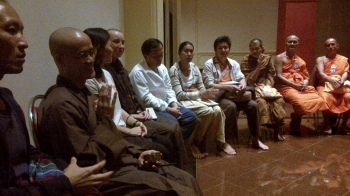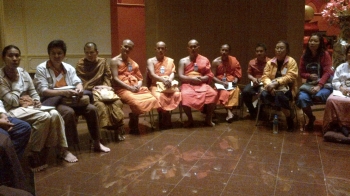This is a written adaptation of a workshop Bro. Phap Kham gave on 07/04/2013. Here, he describes the inner strengths one needs to build a sangha so that one may practice with a community. It is published with his permission.
To see the sangha is to see the Buddha and Dharma. This is a very heavy claim and a heavier duty. So it is important to learn how to build and maintain a sangha, which is the most important locus of practice.
A sangha's main rule is only to live in harmony and awareness. It is not a social club for chatting or casual relations. It is certainly not a Facebook club where we seek more friends and more Likes! But brotherhood and sisterhood can develop and be cultivated through practice. Through the practice of living in harmony and awareness, we naturally come to know more friends. So there is no requirement to be popular to join a sangha. But when you are in a sangha, you will be with many others like you and be cherished by similar seekers.
How does one build a sangha? Firstly, go back to yourself, cultivate joy in yourself, and get used to the practice of slowing down. Start cultivating mindfulness and a pleasant smile, and that is already where the sangha begins. Our energy affects the moods and attitudes of others.
The Plum Village tradition is different from other traditions. Our practice is relatively light and allows us to relax and loosen our muscles and bodies. We also sing and play, and we emphasise the present moment over attainment or results. Because we do not expect anything, any results are wonderful and to be encouraged. We teach everyone, including newcomers, to do things that look like child's play. But it is adults who benefit the most.
All you need to learn for living a happy life has been taught to you. So when you go home to start a sangha, just do the same things because a sangha is part of life too. A sangha needs you to practice these components to be happy:
· Relax,
· Be in touch with the present moment,
· Have a smile,
· Expect nothing of people,
· And be open-minded and open-hearted.
We have guidelines for sitting meditation, walking meditation, bell meditation, total relaxation, and more. They are needed, but they are simply instructions and not as important as the relational skills of brotherhood and sisterhood. An open mind and open heart are much more important in achieving things, and so that we may accept the shortcomings and weaknesses of others. We also need to freely praise the strengths of others. This will help us to live with ourselves and others in the aforementioned harmony and awareness.
We must also not worry about finances, to be preoccupied with seeking donations. We are here to share the Dharma. I remember when when we ran out of money to pay the rent for our tiny Plum Village office in Tsim Sha Tsui. Even then, we stayed put. If our sincere objective was to spread the Dharma, then I did not feel I needed to worry about anything else. Eventually, thanks to the generosity of others, we moved to Lantau Island, to the newly established Asian Institute of Applied Buddhism.
We must also not worry about finances, to be preoccupied with seeking donations. We are here to share the Dharma. I remember when when we ran out of money to pay the rent for our tiny Plum Village office in Tsim Sha Tsui. Even then, we stayed put. If our sincere objective was to spread the Dharma, then I did not feel I needed to worry about anything else. Eventually, thanks to the generosity of others, we moved to Lantau Island, to the newly established Asian Institute of Applied Buddhism.
Geographic distance is a reminder to cherish our time together. We brothers and sisters are scattered around the world. We might not always see each other, but our trips or events together will help us hone our sangha building. We might not meet until after a few years, so it is important to make the present moment a source of happiness.
Let us flow like a river, and fly like a flock of birds.
Back to Plum Village Schools and Educators' Retreat, April 2013 special edition homepage
Back to Plum Village Schools and Educators' Retreat, April 2013 special edition homepage
















